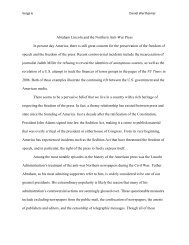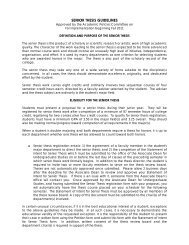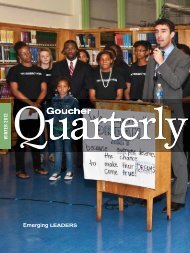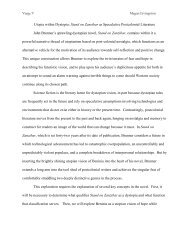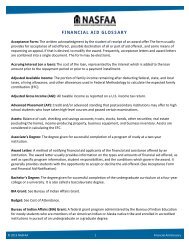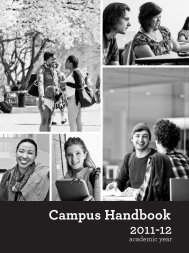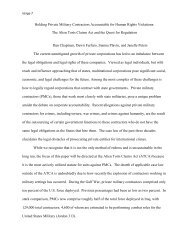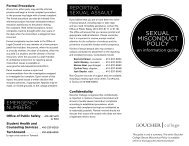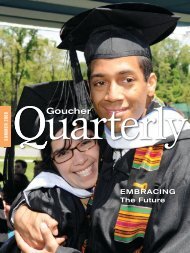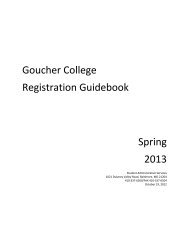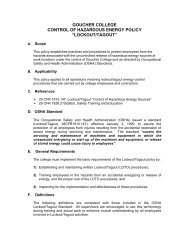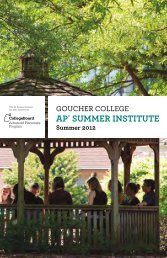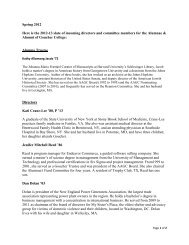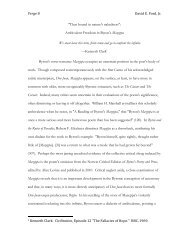Fall 2012 - Goucher College
Fall 2012 - Goucher College
Fall 2012 - Goucher College
Create successful ePaper yourself
Turn your PDF publications into a flip-book with our unique Google optimized e-Paper software.
<strong>Goucher</strong> <strong>College</strong><br />
Course Registration Guidebook<br />
<strong>Fall</strong><br />
<strong>2012</strong><br />
Student Administrative Services<br />
1021 Dulaney Valley Road, Baltimore, MD 21204<br />
410‐337‐6500/FAX 410‐337‐6504<br />
May 21, <strong>2012</strong>
***IMPORTANT***<br />
This document is available to you online.<br />
THE DOCUMENT IS NAMED: <strong>Fall</strong> <strong>2012</strong> Registration Guidebook<br />
ACCESS ON THE WEB AT:<br />
http://www.goucher.edu/documents/Records/GUIDEBOOK%20<strong>2012</strong>FA.pdf<br />
in Acrobat (.pdf) format.<br />
The on‐line schedule reflects all updates, changes and closed courses.<br />
OR: View the schedule on my<strong>Goucher</strong>.<br />
my<strong>Goucher</strong> directly reflects the current course schedule and course enrollments.<br />
For additional information about Records and Registration please visit our web site at:<br />
http://www.goucher.edu/x1875.xml<br />
<strong>Goucher</strong> <strong>College</strong> reserves the right to change or cancel without notice programs of study,<br />
requirements, course offerings, policies, regulations, procedures, calendar, financial aid, fees, or other<br />
matters. Revision and additions to the class schedule are published at the beginning of each semester<br />
and are updated in a timely manner. Failure to read this booklet does not constitute a reason for<br />
noncompliance with the stated college policy. It is the responsibility of the student to keep apprised of<br />
all changes. The <strong>Goucher</strong> <strong>College</strong> Class Schedule Booklet is not to be regarded as a contract.<br />
It is the responsibility of each student to monitor his or her academic progress at <strong>Goucher</strong> <strong>College</strong>. The<br />
student is expected to know the graduation requirements pertinent to his or her program, to be<br />
cognizant of his or her grade point average, to make appropriate elective course selections, and to<br />
add/drop courses to best facilitate attainment of his or her educational goals. To assist in making<br />
these important decisions, the <strong>College</strong> provides each student with an Academic Advisor.<br />
2
Registration Information<br />
UNDERGRADUATE REGISTRATION – <strong>Fall</strong> <strong>2012</strong><br />
Dates for fall <strong>2012</strong> Registration<br />
Academic advising begins for fall <strong>2012</strong> Monday, March 26<br />
Registration begins for fall <strong>2012</strong> Monday, April 9<br />
STEP 1: ACADEMIC ADVISING<br />
Advising for students is March 26 to April 6. Schedule an appointment with your adviser early. Advising<br />
sessions generally take a half hour, sometimes longer.<br />
Use the Academic Catalog (to note required courses) and the fall class schedule to start your planning<br />
process. The schedule will be posted on the web March 21. Bring to the advising session a completed<br />
course change form as a first draft of the courses you want/need to take. Many advisors require that<br />
advisees take this first step before starting an advising session.<br />
After the advising session (which must be in‐person, not via email, unless you are away from <strong>Goucher</strong> this<br />
semester) your adviser will release you for registration. If you need to add courses requiring signatures<br />
other than your advisers, a course change form should be signed by your adviser during the advising<br />
session. (The course change form is available at http://www.goucher.edu/x1893.xml)<br />
Select alternate courses during your advising session, in case your first choices are full.<br />
Prerequisites: You may only register for courses for which you have met the required prerequisites unless<br />
the instructor has signed a course change form to waive them.<br />
ICA’s require acceptance into the program to register. ICA registration will be done by the Registrar’s<br />
Office in SAS. Make sure you calculate the ICA credits into the total you are allowed when registering<br />
online.<br />
Instructors’ signatures are required for audits, closed courses, time overlaps and any course in which you<br />
are required to have the permission of the instructor to enroll. Instructor and department chair<br />
signatures are required for independent work and senior thesis. Registration for any of the above course<br />
types must be done in‐person in the Registrar’s Office (Mon‐Fri, 8:45 a.m.‐5 p.m.) after your assigned day<br />
and time for registration. A completed course change form must be submitted.<br />
When registering on‐line, pass/no pass can only be selected for courses required to be graded as such (PE<br />
activity, PE 135, etc.). Changing from a regular grade to pass/no pass can be done by completing a course<br />
change form and bringing it to SAS after your assigned registration time. See pass/no pass in the catalog<br />
at: http://www.goucher.edu/x13442.xml (p. 52).<br />
Registration for internships requires the Internship Learning Agreement (ILA) be submitted to the Career<br />
Development Office for approval. (Be sure to check deadlines.) After approval by the CDO, the ILA is<br />
submitted to the Registrar’s Office for entry.<br />
STEP 2: RESOLVE HOLDS<br />
Resolve any stop flag (hold), such as those noted by Billing, the Registrar’s Office, the Health Center,<br />
Financial Aid, the Associate Dean’s Office, etc., placed on your account before your assigned start day and<br />
time. Registration can not occur unless the stop flag (hold) is removed. Your holds appear when you log<br />
on to my<strong>Goucher</strong>.<br />
1
STEP 3: REGISTRATION<br />
The deadline to initially register for <strong>Fall</strong> <strong>2012</strong> is Tuesday, May 15. After this date, students will be<br />
charged a $100 fee late registration fee.<br />
The order of registration has been determined by the students’ number of completed credits. Students<br />
will receive notification of their assigned start time via e‐mail March 22. On–line registration groups will<br />
start in 30 minute intervals and can continue to make schedule changes from the assigned time through<br />
Sunday, August 26 at midnight. Beginning August 27, students who have not registered or students who<br />
need to make schedule changes must do so in person in the Office of the Registrar.<br />
Through August 26, students will be able to do add/drops online only if initial approval for registration<br />
was received from the adviser (approval is needed one time only). Your adviser will receive an e‐mail<br />
showing add/drops that are done each day they are processed. Closed courses, time overlaps, credit<br />
overloads, audits, independent work, and special permission courses will need to be registered for in<br />
person, as they may require a manual override. Once a manual override is required for a time overlap,<br />
closed course, or other issue, a manual override will be required for any subsequent schedule change, and<br />
these will have to be made in person in SAS.<br />
Course credit load is determined by your GPA and credits completed (catalog p.51). See course load at:<br />
http://www.goucher.edu/x13442.xml<br />
To register for credit overloads, an approved petition signed by the Associate Dean for Undergraduate<br />
Studies must be brought to the Registrar’s Office in SAS.<br />
If you encounter technical problems, please send an e‐mail message to the helpdesk@goucher.edu. The<br />
helpdesk e‐mail will be monitored for problems during registration.<br />
Current Class Standing as of March <strong>2012</strong><br />
Seniors<br />
87 or more credits completed<br />
Current Juniors<br />
57‐86.99 credits completed<br />
Current Sophomores<br />
27‐56.99 credits completed<br />
Current Freshmen<br />
0‐26.99 credits completed<br />
All classes and<br />
Non‐Candidates<br />
Your registration begins:<br />
Monday, April 9 (7:00 p.m.‐9:00 p.m. assigned start<br />
times). Registration and schedule changes continue<br />
on‐line until Sunday, August 26 at midnight.<br />
Tuesday, April 10 (7:00 to 9:00 p.m. assigned start<br />
times). Registration and schedule changes continue<br />
on‐line until Sunday, August 26 at midnight.<br />
Wednesday April 11 (7:00 to 9:00 p.m. assigned start<br />
times). Registration and schedule changes continue<br />
on‐line until Sunday, August 26 at midnight.<br />
Thursday, April 12 (7:00 to 10:00 p.m. assigned start<br />
times). Registration and schedule changes continue<br />
on‐line until Sunday, August 26 at midnight.<br />
Friday, April 13 (8:00 a.m.) Registration and<br />
schedule changes continue on‐line until Sunday,<br />
August 26 at midnight.<br />
2
Important Information<br />
ADD/DROP PERIOD for fall semester will posted on Important Academic Dates at<br />
http://www.goucher.edu/x13159.xml. Any drops after this period will result in a “W” on the academic<br />
record. Students should always retain a copy of the course change form for their records.<br />
ADVISOR – The Associate Dean for Undergraduate Studies assigns and processes all changes of advisors.<br />
Students must consult with their advisors before making course selections. Course change forms must be<br />
signed by advisors prior to submission to SAS.<br />
AUDITING ‐ Election of the audit must be done at the point of registration for the course or within the<br />
deadline for adding courses. Auditing requires the signatures of the instructor and the advisor. Students<br />
may withdraw from an audit through the last day of classes. <strong>College</strong> policy prohibits changing an audit to<br />
credit or vice versa, after the add/drop deadline.<br />
BALTIMORE STUDENT EXCHANGE PROGRAM ENROLLMENTS – Schedules from BSEP colleges are available<br />
on the web. BSEP registration forms should be submitted to the SAS office with the appropriate<br />
signatures. Participating institutions process the BSEP forms at the end of their students' registration<br />
period. <strong>Goucher</strong> students are notified of acceptance as it occurs. Seniors expecting to graduate in May,<br />
and enrolling in a BSEP course in the spring, must have prior approval from the host college indicating that<br />
the final grade for the course will be submitted to the SAS office at <strong>Goucher</strong> by the published date. BSEP<br />
courses may only be taken in the fall or spring semester (not summer or winter semesters). Ordinarily<br />
only 2 courses may be taken per year. Courses must be taken for regular grade.<br />
INTERNSHIPS (OR OFF‐CAMPUS INDEPENDENT WORK) require separate forms, which are available in the<br />
Career Development Office. These courses will be added to students’ programs upon receipt of the<br />
completed, approved forms from the CDO.<br />
LOCATION OF CLASSES – All classes meet at <strong>Goucher</strong> <strong>College</strong> unless otherwise indicated in the Course<br />
Schedule Booklet.<br />
MAJOR – Forms and instructions for declaring or changing majors are available in the Office of the<br />
Associate Dean for Undergraduate Studies. All students must declare a major before registering for the<br />
first semester of their junior year. The completed forms are submitted to the Office of the Associate Dean<br />
for Undergraduate Studies.<br />
NON‐GOUCHER COURSES – Students may take pre‐approved courses at other institutions during the<br />
summer or winter using the Approval Form for Non‐<strong>Goucher</strong> Courses. Only 15 hours in total, of non‐<br />
<strong>Goucher</strong> summer and winter work with a grade of C‐ or better are applicable to the degree.<br />
PASS/NO PASS – Pass is defined as A through C‐. The course will appear on the transcript, but the GPA<br />
will not be affected. Students receiving a grade of No Pass will not receive credit for the course. Students<br />
may elect to take two courses per academic year on a Pass/No Pass basis. This option is done on a course<br />
change form and can be changed until the pass/no pass deadline at week 10. Courses only offered<br />
Pass/No Pass are not included in the Pass/No Pass course limit. Honors courses cannot be taken Pass/No<br />
Pass. Students entering fall 1991 and thereafter cannot elect courses in the major as Pass/No Pass unless<br />
the courses are graded only on a Pass/No Pass basis.<br />
REPEATED COURSES – Students may repeat any courses for which they received less than a C‐ grade.<br />
Both the original grade and the grade for the repeated course are included in the GPA, but the credits are<br />
counted only once. If a student repeats a course for which a passing grade of below C‐ was received the<br />
first time, the student will receive a grade of RA, RB, RC… the second time the course is taken.<br />
Departments decide if students must repeat courses in the major if the grades are below C‐, or if they will<br />
permit the students to substitute other courses for the major. Approval must be obtained from the<br />
appropriate department chair if a student wishes to repeat a course over this limit. If a student repeats a<br />
course for which a grade of C‐ or above was received the first time, the student will receive a grade of XA,<br />
XB, XC… the second time the course is taken. A student will not receive credit and X grades are not<br />
3
calculated into the GPA. The policy does not include courses which may be repeated for credit as listed in<br />
the catalogue.<br />
SEVEN‐WEEK COURSES – Subsession 01 indicates that the course meets for the entire semester. 02<br />
indicates that the course meets for the first seven weeks. 03 indicates that the course meets for the<br />
second seven weeks. Students should register for 7 week courses during registration. There is a special<br />
add/drop period for these classes.<br />
SENIOR THESIS – In order to register for a Senior Thesis, students must complete a Senior Thesis Form and<br />
obtain signatures from the faculty advisor selected by the student, the department chair, and advisor.<br />
The Senior Thesis form must be filed with the Associate Dean for Undergraduate Studies.<br />
4
Liberal Education Requirements<br />
For all students beginning at <strong>Goucher</strong> in <strong>Fall</strong> 2011<br />
Updated for <strong>2012</strong>‐2013 Academic Year 3/21/12<br />
*asterisked courses are offered in <strong>Fall</strong> <strong>2012</strong><br />
Frontiers introduces new students to the liberal arts and sciences and invites them to become active participants in<br />
<strong>Goucher</strong>'s rich intellectual community. They are encouraged to examine their assumptions and values as they explore<br />
those of others. The seminars also emphasize the value to the academic environment of collaborative learning and<br />
information technologies and foster independent thought, intellectual curiosity, and the joy of learning. <strong>Goucher</strong> II<br />
students who enter as first‐year students are required to enroll in Frontiers. ISP 110 and 110Y taken in the fall<br />
semester fulfill the Frontiers requirement. All incoming first‐year students are required to pass:<br />
* FRO 100 FRO 140 ISP 110 * ISP 110Y<br />
Academic writing/Writing proficiency. (LER ‐ WP) Students must demonstrate proficiency in written communication.<br />
This will be satisfied by demonstrating proficiency within the English composition sequence of courses or through a<br />
portfolio. Courses that may be used to demonstrate writing proficiency include:<br />
* ENG 105 *ENG 106 Writing Across the<br />
Curriculum (WAC)<br />
course.<br />
Foreign Language. (LER ‐ FL) Students must demonstrate proficiency in foreign language through intermediate level.<br />
Study of a foreign language imparts to students practical linguistic skills and deep understanding of the cultural codes<br />
of other societies. Foreign language proficiency grants privileged access to the nuances of fundamental texts in fields<br />
such as literature, philosophy, and social and political theory, and to foreign media and other accounts of current<br />
events. Courses that may be used to satisfy this requirement include:<br />
*ARB 130 *GER 130 IT 130G *SP 130<br />
GER 130G *JS 130 *SP 130S *FR 130<br />
IT 130 *RUS 130 SP 130E SP 130V<br />
Social Sciences. (LER ‐ SSC) Students must demonstrate an understanding of relationships between individuals and<br />
social structures, as they pertain to the distribution of limited cultural, political, natural, and/or economic resources.<br />
This will be achieved by introducing students to the methods used by social scientists to analyze how societies and<br />
social institutions behave, at a point in time as well as over time. Courses in the social sciences and designated other<br />
courses can be used to satisfy this requirement.<br />
*ANT 107 *BUS 229 *BUS 231 BUS 245 BUS 260 *EC 100<br />
*EC 101 *EC 102 *ED 101 *ED 103 ISP 110/*110Y *PSC 100<br />
PSC 111 PSC 112 PSC 113 PSC 114 *SOC 106 WS 192<br />
Natural Sciences. (LER ‐ NS) Students must demonstrate an ability to interpret and present information about the<br />
natural world through studying the methods of scientific discovery and their relationship to the fundamental concepts<br />
and contents of a natural sciences discipline. Introductory laboratory courses in the natural sciences and selected<br />
other laboratory courses may be used to fulfill this requirement.<br />
* AST 110 AST 110G * BIO 104 BIO 105 BIO 107 BIO 111 *COG 110<br />
*BIO 170<br />
CHE105/with<br />
106<br />
*CHE 111/with<br />
112<br />
*PHY 115 *PHY 125 * PSY 111/with<br />
112<br />
Mathematical Reasoning. (LER ‐ MR) Students must demonstrate an understanding of the elegance of abstract<br />
structure and be able to reason logically. This requirement will be satisfied by a course in mathematics, computer<br />
science or logic whose content may take the form of symbolic proofs (logical or mathematical), statistical or graphical<br />
analysis of numerical data, problem solving using mathematical methods, or implementation of computer algorithms.<br />
Designated courses from across the curriculum may be taken to satisfy this requirement.<br />
*CS 105 *CS 116 *EC 206 *MA 100 MA 110 MA 113<br />
MA 140 *MA 141 MA 155 *MA 160 *MA 170 MA 171<br />
*MA 180 *MA 216 MA 221 *MA 222 *MA 240 *PSY 200<br />
5
Artistic/creative expression. (LER ‐ ARC) Students must demonstrate an understanding of artistic expression and the<br />
creative process through practical engagement in a fine, performing, or literary art. Courses in the arts and<br />
designated other courses may be used to satisfy this requirement.<br />
*ART 102 *ART 114 *ART 127 * ART 201 *ART 204 *ART 225<br />
*DAN 114 *DAN 115 *DAN 120 *DAN 121 *DAN 131 * DAN 140<br />
DAN 141 DAN 142 *DAN 143 *DAN 260 *ENG 120 *ENG 202<br />
*ENG 205 *ENG 226 *MUS 101 *MUS 105 *MUS 144 *THE 120<br />
THE 140 THE 231 *THE 232 *MUS 210<br />
Textual analysis and critical perspectives. (LER ‐ TXT) Students must demonstrate, using primary sources, an<br />
understanding of the formal qualities of the text, and/or the thematic content and the context (i.e., cultural,<br />
economic, historical, literary, philosophical, political, societal, and/or religious) in which those sources were created.<br />
Courses in the humanities and designated other courses may be used to satisfy this requirement.<br />
ARB 230 *ART 103 *ART 249 COM 219 *COM 237 *COM 239<br />
COM 245 ENG 111 ENG 240 ENG 256 *ENG 270 *ENG 275<br />
ENG 285 *FR 245 FR 256 FR 258 *GER 234 GER 240<br />
GER 250 *GER 251 *GER 259 GER 260 *HIS 110 * HIS 111<br />
*HIS 113 *HIS 116 * HIS 117 HIS 233 *HP 110 JS 105<br />
*JS 205 JS 242 *MUS 100 MUS 108 *MUS 115 MUS 117<br />
*PHL 105 PHL 120 PHL 157 *RLG 153 RLG 206 RLG 210<br />
RLG 237 RUS 253 *RUS 269 *SP 254 *SP 294 *THE 103<br />
THE 200 THE 238 WL 260 (12/SP<br />
only)<br />
*WL 280 WS 227 WS 265<br />
Understanding Diverse Perspectives. (LER ‐ DIV) Students must demonstrate an understanding of the range of human<br />
experiences and perspectives across social categories, such as gender, class, race, ethnicity, religious background,<br />
able‐bodiness, or sexual orientation. Designated courses across the curriculum that emphasize one or more of these<br />
categories fulfill this requirement.<br />
ANT 234 ANT 275 ARB 230 COM 213 COM 257 *ED 103<br />
ENG 240 ENG 256 *ENG 275 ENG 285 *FR 245 FR 256<br />
FR 258 GER 250 * HIS 110 *HIS 111 JS 105 JS 270<br />
*LAM 105 LAM 268 *LAM 280 *PHL 105 *PHL 115 *PSY 219<br />
*RLG 130 RLG 207 RLG 212 *RLG 236 RLG 237 RLG 273<br />
SOC 220 SP 263 SP 265 *SP 294 SPE 100 *WS 100<br />
WS 192 WS 227 *WS 230 WS 242<br />
Study Abroad. (LER ‐ SA) Students must demonstrate practical understanding of global citizenship and gain<br />
intercultural awareness through a study‐abroad experience. By studying abroad students will explore different ways<br />
of thinking, communicating, working, learning and living. Study abroad courses sponsored by <strong>Goucher</strong> or by other<br />
colleges may fulfill this requirement.<br />
BIO 272G COM 272G COM 272Y *ED 103 GER 130G<br />
GER 272G PHL 272Y PSY 272G SP 130C SP 130E<br />
Environmental Sustainability. (LER ‐ ENV) Students must demonstrate knowledge of scientific, policy, social, cultural,<br />
and/or historical dimensions of human relationship to the environment. This should include themes of sustainability<br />
and the nature of the environment systems, their change, and threats to their continued function as a result of<br />
human activity. Designated courses across the curriculum will satisfy this requirement.<br />
ART 262 *BIO 170 BIO 204 BIO 238 *BIO 240 BIO 244<br />
BIO 272G BUS 141 CHE 106 *CHE 270 *COM 225 *EC 225<br />
ENG 112 *ES 100 ES 130E *ES 140 *ES 200 ES 204<br />
ES 238 *ES/PSY 245 ES/PSC 275 *FR 344 *HP 110 *MA 141<br />
MA 155 MA 171 PHL 205 PHY 250 *PSC 140 WS 242<br />
Connections – *FYE 134<br />
PE Activity ‐ *various<br />
6
General Education Requirements <strong>2012</strong>‐2013<br />
For all students beginning at <strong>Goucher</strong> prior to <strong>Fall</strong> 2011.<br />
*asterisked courses are offered in <strong>Fall</strong> <strong>2012</strong><br />
1. Students must demonstrate proficiency in written communication. (For a more detailed description of this<br />
requirement, refer to the <strong>College</strong> Writing Proficiency section of this catalogue.) This will be satisfied by demonstrating<br />
proficiency within the English composition sequence of courses or through a portfolio.<br />
*ENG 104 *ENG 105 *ENG 106<br />
Writing across the curriculum (WAC)<br />
course<br />
2. Students must demonstrate proficiency in a foreign language through the intermediate level. (For a more detailed<br />
description of this requirement, refer to the Foreign Language Proficiency section of the Academic Catalogue on page<br />
39.)<br />
*ARB 130 CHI 130 *FR 130 or 130G FRO 140 *GER 130 or 130G<br />
IT 130 or IT 130G *JS 130 *RUS 130 *SP 130, 130C, 130E,<br />
130G,130S or 130V<br />
GER 272G<br />
3. Students must become informed global citizens and gain intercultural awareness through a study‐abroad<br />
experience. (For a more detailed description of this requirement, refer to the Study Abroad section in the Academic<br />
Catalogue, beginning on page 40.)<br />
ART 272G AST 110G BIO 272G BUS 225 BUS (MGT) CHE 272Y COM 272G COM 272Y<br />
272G<br />
*DAN 272Y ED 272Y ENG 272G ENG 272Y FR 272G FR 272Y GER 130G GER 230 GER 272G<br />
GER 272Y HIS 272G HIS 272Y IT 110G IT 120G IT 130G IT 272G IT 272Y JS 272G<br />
JS 272Y LAM 272G LAM 272Y MUS 272G MUS 272Y PCE 272Y PHL 272G PHL 272Y *PSC 272Y<br />
RLG 272G RLG 272Y RUS 272G *SOC 272Y SP 120C SP 120G SP 130C SP 130E SP 130G<br />
SP 220G SP 225 SP 229CR *SP 229E SP 230CR SP 238G SP 272Y THE 272G THE 272Y<br />
WS 272G WS 272Y<br />
Study abroad courses sponsored by <strong>Goucher</strong> or by other colleges may fulfill this requirement.<br />
4. Students must become acquainted with different ages, societies, and cultures and learn how to use a variety of<br />
historical sources. This will be satisfied by courses identified throughout the curriculum that deal with the past.<br />
*ANT 238/HIS 227 *ART 103 ART 260 *ART 266 ART 268 ART 273<br />
ART 276 ART 277 *ART 278/HIS 278 *ART 280 ART 281 ART 284<br />
COM 219 *COM 239 COM 245 *DAN131/with 231 DAN 251 DAN 255<br />
*ENG 211 ENG 212 *ENG 230 *ENG 232 ENG 240 ENG 241<br />
ENG 246 ENG 249 ENG 254 ENG 257 ENG 259 ENG 260<br />
ENG 264 *ENG 275 ENG 276 ENG 330 *ENG 350 FR 258<br />
GER 233/HIS 233 *GER259/HIS237/JS259 *GER/HIS/JS 251 *HIS 110 *HIS 111 *HIS 113<br />
*HIS 116 *HIS 117 HIS 120 HIS 259 HIS/LAM 268 *HP 110<br />
ISP 110 *ISP 110Y *JS/RLG 205 JS/RLG 242 JS/RLG 247 *LAM 105<br />
MA 260 MUS 108 *MUS 109 *MUS 115 MUS 117 *MUS 249<br />
MUS 260 MUS 360 PCE 257/HIS 257 PCE262/HIS262/SOC262 PHL 157 PHL 216<br />
*PHL 218 PHL 219 PHL 224/THE 202 *PHL 226/RLG 226 PHL 260 PHL 268/RLG 268<br />
PSC 203 RLG 200 RLG 206 RLG 210 RLG 214 RLG 225<br />
SOC 271 SP 350 WS 225 WS 300<br />
5. Students must be able to reason abstractly and appreciate the elegance of abstract structure. This will be satisfied<br />
by a course in mathematics or logic. Courses from across the curriculum may be taken to satisfy this requirement.<br />
*CS 105 *CS 116 *EC 206 *MA 100 MA 110 MA 113<br />
MA 140(105) *MA 141 MA 155 *MA 160(114) MA 170(117) MA 171<br />
*MA 180(118) MA 190(125) *MA 216 MA 221 *MA 222 *MA 240<br />
*PHL 176 PHY 280 *PSY 200<br />
6. Students must understand the methods of scientific discovery and experimental design. This will be<br />
satisfied by a natural science course with a laboratory.<br />
*AST 110 AST 110G *BIO 104 BIO 105 BIO 107 BIO 111<br />
BIO 140 *BIO 170 *BIO 210/with 214 BIO 220/with 224 *BIO 240/with 241 *BIO 260<br />
BIO 261 BIO 324/with 324L BIO 327/with 328 BIO 333/with 334 BIO 343/with 343L *BIO 354/with 354L<br />
BIO 362/with 363 BIO 378/with 378L CHE 105/with 106L CHE 107 *CHE 111/with 112 CHE 294<br />
or 112H<br />
CHE 395Y *COG 110 *ES 100 *PHY 115 PHY 116 *PHY 125<br />
*PHY 126 *PHY 220/with 230 *PSY 111/with 112 SP 130G/with AST<br />
110G<br />
SP 238G/with AST<br />
110G<br />
7
7. Students must acquire problem‐solving and research capability by identifying, locating, evaluating, and effectively<br />
using information. This will be satisfied by courses identified throughout the curriculum.<br />
*ART 249 AST 395 BIO 324 BIO 355 BIO 374 BIO 379<br />
*BIO 382 BIO 384 BIO 387 *BUS (MGT)210 BUS (MGT) 320 *BUS (MGT)331<br />
BUS (MGT)380 CHE 294 CHE 295 CHE 330 CHE 395Y *COM 262<br />
CS 320 *CS 325 CS 340 *EC 397 *ENG 200 ENG 241<br />
*ENG 340 ENG 361 ES 390 ES 399 *HIS 305 MA 241<br />
MA 260 *MA 347 *MUS 210 *PCE 205 PCE 210 PCE 325<br />
PHL 218 PHL 235/RLG 235 PHL 275/COG 275 *PHL 332 *PHY 220/with 280 PHY 395<br />
PSC 241/HIS 241 *PSY 252 *PSY 255 RLG 331 RLG 355 SOC 217<br />
WS 252 WS/PSC 260 *WS 320<br />
8. Students must be able to analyze and understand the creative process, assimilate experience, and<br />
communicate it. This course will be satisfied by courses identified throughout the curriculum.<br />
*ART 102 *ART 114 *ART 127 ART 137 *ART 201/COM<br />
202<br />
*ART 203/COM<br />
203<br />
*ART 204 ART 206 ART 213 *ART 225 ART 229 *ART 230<br />
ART 238 ART 310 ART 312 ART 331 *ART 380 *COM 132<br />
COM 189 COM 207/THE 207 COM 233 *COM 286 DAN 250 *DAN 260 (252)<br />
*ENG 120 *ENG 202 *ENG 205 *ENG 226 ENG 305 ENG 307<br />
FR/THE 272Y *MUS 101 MUS 104 *MUS 105 MUS 106 *MUS 121<br />
MUS 152 MUS 153 *MUS 205 MUS 206 *MUS 210 MUS 305<br />
MUS 306 *PCE 131/THE 131 *PCE 242 *THE 120 THE140/with140L THE 205<br />
*THE 220 THE 231 THE 272 (if topic<br />
appropriate)<br />
9. Students must be able to interpret words, images, objects, and/or actions that are expressions of human culture.<br />
This course will be satisfied by courses identified throughout the curriculum.<br />
*ANT 107 *ART 103 ART 260 ART 262 ART 266 ART 268<br />
ART 273 ART 276 ART 277 ART 278/HIS 278 *ART 280 ART 281<br />
ART 284 ART 286 ART 310 ART 331 *BUS (MGT)221 *BUS (MGT) 229<br />
BUS (MGT) 231 COM 219 *COM 234 *COM 237 *COM 239 COM 245<br />
COM 256 COM 257 *DAN 114, *115, DAN *131/231 DAN 190(103) DAN 250<br />
*217, *218,<br />
*219/with *120,<br />
*121, *220, *221,<br />
*222, 321, 322, 323<br />
DAN 251 DAN 255 ENG 111 *ENG 211 ENG 212 *ENG 215<br />
ENG 222/WS 222 *ENG 232 ENG 240 ENG 246 ENG 254 ENG 255<br />
ENG 257 ENG 259 ENG 260 ENG 264 *ENG 270 ENG 256<br />
ENG 273 ENG 276 ENG 277 ENG 280 ENG 285<br />
ENG 330 *ENG 340 *ENG 350 ENG 361 *FR 245 FR 256<br />
FR 351 GER 250/WL 250 GER 260/HIS 229/JS HIS 282/WS 282 *JS/RLG 205 JS/RLG 242<br />
246<br />
JS/RLG 247 *LAM 280 *MUS 100 *MUS 101 MUS 104 MUS 106<br />
MUS 108 *MUS 115 MUS 117 MUS 152 MUS 153 MUS 203<br />
*MUS 205 MUS 206 *MUS 249 MUS 260 MUS 305 MUS 360<br />
PCE 124 PCE 231 PHL 120 PHL 212/ART 207 *RLG 130 *RLG 153<br />
RLG 200 RLG 207 RLG 209 *RUS 251 *RUS 395 RUS 396<br />
RUS/WL 254 RUS/WL 259 *SOC 106 *SP 254 *SP 294 *THE 103<br />
THE 200 THE 204 *THE 211 *THE 220 THE 231 WL 210<br />
WL 230 *WL/RUS 269 *WS 100 WS 150 WS 217/LAM 217 *WS 224<br />
WS/HS 282<br />
10. Students must understand the complex nature of social structures and/or human relationships that involve issues<br />
of inequality and difference. This will be satisfied by courses identified throughout the curriculum.<br />
*AFR 200 AMS 238 *ANT 107 *ANT 238/HIS 227 *BUS (MGT)221 *BUS 231<br />
BUS 245 *BUS (MGT) 331 COM 213 *COM 237 COM 257 *EC 100<br />
*EC 101 *EC 102 EC 241 EC 242 EC 250 EC 265<br />
EC 271 *EC 320 EC 396 *EC 397 *ED 103 ED 215<br />
ENG 249 *ENG 275 ENG 285 ENG 392 FR 258 FR 295<br />
FR 351 GER 250/WL 250 *GER259/HIS 237/JS259 *HIS 110 *HIS 111 *HIS 113<br />
*HIS 116 *HIS 117 HIS 120 HIS 259 HIS/LAM 268 ISP 110<br />
*ISP 110Y JS/RLG 247 *LAM 105 LAM 217/WS 217 LAM/WS 226 *LAM 280<br />
*MUS 109 PCE 120 PCE 124 *PCE 148 *PCE 205 PCE 231<br />
*PCE 242 PCE 325 *PCE/THE 131 *PHL 105 PHL 201 PHL 217<br />
PHL 231 PHL 243 PHL 245 PHL 254 PHL 276/WS 276 PHL 280<br />
*PSY 226 *PSY 230 *RLG 236/WS 236 RLG 238/AMS 238 RLG 239/PSC 239 RLG 273<br />
RLG 274 RLG 315 RLG 255 *SOC 106 SP 320 WL 210<br />
8
WL 230 *WS 100 WS 150 WS 222/ENG 222 *WS 224 *WS 225<br />
*WS 230 WS 242 *WS 250 WS 265 WS 276 WS 282/HIS 282<br />
WS 300 *WS 320 WS/LAM 226 WS/PSC 260<br />
11. Students must explore ecological, policy, social, cultural, and/or historical dimensions of human<br />
relationship to the environment. This may include but need not be limited to themes of sustainability and the nature<br />
of the environment systems, their change, and threats to their continued function as a result of human activity. This<br />
general education requirements begin with students entering <strong>Fall</strong> 2007.<br />
AMS 210 ART 262 *BIO 170 BIO 204 BIO 238 *BIO 240<br />
BIO 243(Costa BIO 244 (Costa BIO 272G BIO 333 BIO 343 BUS 141<br />
Rica)<br />
Rica)<br />
CHE 106 *CHE 270 CHE 295E *COM 225 *EC 225 ENG 112<br />
*ES 100 ES 130E *ES/PSC 140 *ES 200 ES 204 ES 238<br />
*ES/PSY 245 ES/PSC 275 *MA 141 MA 155 MA 171 PHL 205<br />
PHY 250 PSC 285 WS 242 Advanced<br />
Placement in<br />
Environmental<br />
Science with a<br />
score of 4 or<br />
5.<br />
*FR 344<br />
Frontiers<br />
* FRO 100 FRO 140 ISP 110 * ISP 110Y<br />
Connections – *FYE 134<br />
PE Activity ‐ *various<br />
9
Writing Across the Curriculum (WAC)<br />
Writing across the curriculum courses are intended primarily for college writing proficiency, unless they<br />
also have been specifically designated as a writing proficiency in the major requirement by a department<br />
(see writing proficiency in the major). Students must sign a contract with the course instructor in order to<br />
take a course for <strong>College</strong> Writing Proficiency. Writing across the curriculum courses include:<br />
COG/PHL 275<br />
Epistemology<br />
DAN 250<br />
DAN 251<br />
DAN 255<br />
ENG 219<br />
ENG/WS 222<br />
Twentieth Century Dance and Its Relation to Other<br />
Modern Art<br />
Great Choreographers and Dancers<br />
American Dance Tradition<br />
Linguistics<br />
Women and Literature<br />
* ENG 230 The Classical Tradition<br />
ENG 240<br />
ENG 243<br />
ENG 260<br />
ENG 264<br />
ENG 276<br />
ENG 277<br />
ENG 285<br />
Medieval Literature<br />
Renaissance Literature<br />
The Early English Novel<br />
The Later English Novel<br />
Modern Poetry<br />
Contemporary American Poets<br />
Between Two Worlds<br />
ENG 330 Special Topics in English Literature to 1700<br />
HIS 238<br />
Comparative History of Colonialism in Asia<br />
* MUS 313 Computer Music Seminar<br />
* PHL 220 Phenomenology<br />
* PHL/RLG 226 Medieval & Renaissance Philosophy<br />
PHL/RLG 235<br />
PHL 260<br />
PSC 201<br />
PSC 224<br />
PSC 225<br />
PSC 227<br />
RLG 228<br />
SOC 217<br />
Hermeneutics & Deconstruction<br />
Ancient Philosophy<br />
Modern Political Thought<br />
European Politics Today<br />
British Politics<br />
The Politics of Germany<br />
Philosophy of Religion<br />
Methods of Social Research<br />
10
THE 200<br />
WS/ENG 222<br />
WS 224<br />
WS 227<br />
WS 240<br />
Twentieth Century Theatre<br />
Women and Literature<br />
Gender, Identity, and Race in Caribbean Culture<br />
Becoming Visible: Metamorphosis Mod Women<br />
Women, War, and Peace<br />
* WS 250 Selected Topics in Women's Studies: Haiti<br />
WS /PHL 276<br />
Feminist Philosophy<br />
*asterisked courses are offered as WAC in fall <strong>2012</strong><br />
11
Writing Proficiency in the Major<br />
American Studies<br />
Consult department chair.<br />
Anthropology SOC 210<br />
Art<br />
Complete at least two 200 or 300‐level courses in Art History<br />
with a grade of C or better<br />
Biological Sciences BIO 214 BIO 240<br />
BIO 224 BIO 260<br />
Chemistry CHE 265L CHE 346<br />
CHE 266L CHE 356<br />
CHE 342 CHE 373<br />
Comunication & Media Studies<br />
COM 262‐ with a grade of B‐ or higher<br />
(Complete before second semester junior year)<br />
Computer Science CS 245 ENG 206<br />
CS Senior Thesis MA 260<br />
Dance<br />
Dan 390 – with a grade of B‐ or better<br />
Economics<br />
ENG 206 with a grade of C‐ or better<br />
Education ED 210 ENG 226<br />
ED 222 SPE 320<br />
English ENG 200<br />
French<br />
Any 300 level course in the major<br />
Historic Preservation HP 320/ART 347<br />
History HIS 338 HIS 387<br />
Individualized Interdisciplinary Major<br />
Consult IDS Chair.<br />
International Relations PSC 200 PSC 263<br />
PSC 224 PSC 257<br />
PSC 264 PSC 258/JS 258<br />
Any 200 or 300 level course with permission of instructor<br />
Management ENG 206<br />
Mathematics CS 245 MA 260<br />
ENG 206 MA Senior Thesis<br />
Music MUS 260 MUS 349<br />
Peace PCE 205<br />
Philosophy<br />
Consult department chair<br />
Physics ENG 206<br />
Political Science PSC 200 PSC 202<br />
PSC 258 PSC 207<br />
PSC 263 PCS 224<br />
PSC 264 PSC 225<br />
PSC 282 PSC 227<br />
Any 200 or 300 level course with permission of<br />
Instructor<br />
Psychology PSY 252 PSY 255<br />
Religion<br />
Consult department chair.<br />
Russian<br />
Any 300‐level course in the major.<br />
Sociology SOC 210<br />
Spanish<br />
Any 300‐level course in the major<br />
Special Education ED 210 ED 222<br />
SPE 320 SPE 324<br />
SPE 326 SPE 328<br />
Theatre THE 390/391<br />
Women’s Studies WS 224 WS 300<br />
WS 227 WS 320<br />
12
<strong>Fall</strong> <strong>2012</strong> Cross Courses<br />
Cross<br />
Courses Title Section Day Start Time End Time Bldg Rm<br />
ANT 238/<br />
HIS 227<br />
Cultures of Contemporary<br />
Europe<br />
001 MWF 11:00 AM 12:10 PM TIC 202<br />
ART 201/<br />
COM 202<br />
ART 201/<br />
COM 202<br />
ART 201/<br />
COM 202<br />
ART 203/<br />
COM 203<br />
ART 209/<br />
COM 209<br />
ART 285/<br />
COM 210<br />
COM 202/<br />
ART 201<br />
COM 202/<br />
ART 201<br />
COM 202/<br />
ART 201<br />
COM 203/<br />
ART 203<br />
COM 205/<br />
ES 205<br />
COM 209/<br />
ART 209<br />
COM 210/<br />
ART 285<br />
DAN 146/<br />
MUS 146<br />
DAN 146/<br />
MUS 146<br />
ES 140/<br />
PSC 140<br />
ES 140/<br />
PSC 140<br />
ES 205/<br />
COM 205<br />
ES 245/<br />
PSY 245<br />
ES 245/<br />
PSY 245<br />
Basic Photography 001 TUTH 7:00 PM 8:50 PM MAC 220<br />
Basic Photography 002 TUTH 9:00 AM 10:50 AM MAC 220<br />
Basic Photography 003 MW 1:30 PM 3:20 PM MAC 220<br />
Intermediate Photography 002 TUTH 12:30 PM 2:20 PM MAC 220<br />
Photojournalism &<br />
Documentary Photography<br />
001 M 9:00 AM 11:50 AM MAC 220<br />
History of Photography 001 MW 11:00 AM 12:15 PM MAC 106<br />
Basic Photography 001 TUTH 7:00 PM 8:50 PM MAC 220<br />
Basic Photography 002 TUTH 9:00 AM 10:50 AM MAC 220<br />
Basic Photography 003 MW 1:30 PM 3:30 PM MAC 220<br />
Intermediate Photography 002 TUTH 12:30 PM 2:20 PM MAC 220<br />
Science Communication &<br />
Writing<br />
Photojournalism &<br />
Documentary Photography<br />
001 W 12:30 PM 3:00 PM VM 201<br />
001 M 9:00 AM 11:50 AM MAC 220<br />
History of Photography 001 MW 11:00 AM 12:15 PM MAC 106<br />
African Drum & Dance<br />
Ensemble<br />
African Drum & Dance<br />
Ensemble<br />
Introduction to Environmental<br />
Sciences<br />
Introduction to Environmental<br />
Sciences<br />
Science Communication &<br />
Writing<br />
Psychology of Environmental<br />
Problems<br />
Psychology of Environmental<br />
Problems<br />
001 TU 9:00 PM 10:15 PM ML 001<br />
001 M 9:00 PM 10:15 PM ML 001<br />
001 TUTH 8:30 AM 9:45 AM VM G07<br />
002 TUTH 3:00 PM 4:15 PM HS 153<br />
001 W 12:30 PM 3:00 PM VM 201<br />
001 TUTH 9:55 AM 11:10 AM HS 153<br />
002 TUTH 3:00 PM 4:15 PM HS 137<br />
13
GER 251/<br />
HIS 251/<br />
JS 251<br />
GER 259/<br />
HIS 237/<br />
JS 259<br />
HIS 227/<br />
ANT 238<br />
HIS 237/<br />
GER 259/<br />
JS 259<br />
HIS 251/<br />
GER 251/<br />
JS 251<br />
HIS 311/<br />
HP 311<br />
HP 311/<br />
HIS 311<br />
JS 205/<br />
RLG 205<br />
JS 251/<br />
GER 251/<br />
HIS 251<br />
JS 259/<br />
GER 259/<br />
HIS 237<br />
LAM 280/<br />
WL 280<br />
MUS 146/<br />
DAN 146<br />
MUS 146/<br />
DAN 146<br />
PCE 231/<br />
WS 250<br />
PHL 226/<br />
RLG 226<br />
PSC 140/<br />
ES 140<br />
PSC 140/<br />
ES 140<br />
PSY 245/<br />
ES 245<br />
PSY 245/<br />
ES 245<br />
RLG 205/<br />
JS 205<br />
RLG 226/<br />
PHL 226<br />
Jews in Germany 001 TUTH 1:10 PM 2:25 PM VM G05<br />
Oral History of Holocaust<br />
Survivors - Telling Their Stories<br />
Cultures of Contemporary<br />
Europe<br />
Oral History of Holocaust<br />
Survivors - Telling Their Stories<br />
001 TUTH 11:45 AM 1:00 PM VM 103<br />
001 MWF 11:00 AM 12:10 PM TIC 202<br />
001 TUTH 11:45 AM 1:00 PM VM 103<br />
Jews in Germany 001 TUTH 1:10 PM 2:25 PM VM G05<br />
Public History: Theory &<br />
Practice<br />
Public History: Theory &<br />
Practice<br />
001 TUTH 9:55 AM 11:35 AM TIC 200<br />
001 TUTH 9:55 AM 11:15 AM TIC 200<br />
Judaism 001 TUTH 12:00 PM 1:15 PM VM 101<br />
Jews in Germany 001 TUTH 1:10 PM 2:25 PM VM G05<br />
Oral History of Holocaust<br />
Survivors - Telling Their Stories<br />
Selected Topics: Latin<br />
American Stories<br />
African Drum & Dance<br />
Ensemble<br />
African Drum & Dance<br />
Ensemble<br />
001 TUTH 11:45 AM 1:00 PM VM 103<br />
001 MW 1:30 PM 2:45 PM TIC 203<br />
001 M 9:00 PM 10:15 PM ML 001<br />
001 TU 9:00 PM 10:15 PM ML 001<br />
Special Topics: Haiti 001 M 7:00 PM 9:30 PM VM 202<br />
Medieval & Renaissance<br />
Philosophy<br />
Introduction to Environmental<br />
Sciences<br />
Introduction to Environmental<br />
Sciences<br />
Psychology of Environmental<br />
Problems<br />
Psychology of Environmental<br />
Problems<br />
001 W 12:30 PM 3:00 PM VM 202<br />
001 TUTH 8:30 AM 9:45 AM VM G07<br />
002 TUTH 3:00 PM 4:15 PM HS 153<br />
001 TUTH 9:55 AM 11:10 AM HS 153<br />
002 TUTH 3:00 PM 4:15 PM HS 137<br />
Judaism 001 TUTH 12:00 PM 1:15 PM VM 101<br />
Medieval & Renaissance<br />
Philosophy<br />
001 W 12:30 PM 3:00 PM VM 202<br />
14
RLG 236/<br />
WS 236<br />
RUS 269/<br />
WL 269<br />
WL 269/<br />
RUS 269<br />
WL 280/<br />
LAM 280<br />
WS 236/<br />
RLG 236<br />
WS 250/<br />
PCE 231<br />
Womanist Theory 001 TUTH 9:55 AM 11:10 AM VM G02<br />
Russian Fairytales 001 MWF 2:30 PM 3:20 PM VM G05<br />
Russian Fairytales 001 MWF 2:30 PM 3:20 PM VM G05<br />
Selected Topics: Latin<br />
American Stories<br />
001 MW 1:30 PM 2:45 PM TIC 203<br />
Womanist Theory 001 TUTH 9:55 AM 11:35 AM TIC 202<br />
Special Topics: Haiti 001 M 7:00 PM 9:30 PM VM 202<br />
15
Descriptions for New and Special Topics Courses<br />
<strong>Fall</strong> <strong>2012</strong><br />
ART<br />
ART 288.001 Art and the Individual in Islamic Lands and Beyond (3)<br />
Dr. Amy Landau, Associate Curator, Walters Art Museum<br />
Wednesdays, 7‐9:30, please note that two of the scheduled Wednesday classes will meet on Saturday<br />
from 11‐12:30 at the Walters Art Museum.<br />
This class surveys art and architecture of Muslim societies, from the seventh century to the present day,<br />
by focusing on individuals and relationships between artists, patrons, and consumers threaded together<br />
‘as pearls on a string,’ a frequent metaphor used in the Islamic world for human connectivity. Our<br />
discussions will be built around captivating narratives that feature specific men and women, from the<br />
famed painter to the anonymous craftsman. The Walters’ little‐known but exceptional collection of<br />
Islamic art will provide a basis for this seminar, which is offered in conjunction with planning for an<br />
international exhibition organized by the Museum. During term, students will be asked to design a<br />
vignette for this exhibition that focuses on a personality discussed in class.<br />
Prerequisite: ART 103 or permission of the instructor.<br />
ART 380.001 The Extended Photographic Project (4)<br />
This course is a continued exploration of photography as a creative medium, allowing student to pursue<br />
individual photographic interests while stressing critical thinking skills. This personal vision course offers<br />
students already comfortable with their technical skills the opportunity to explore different avenues in<br />
their image‐making. Students are further challenged to analyze and question photographic and other<br />
art‐making conventions. The classes are heavily critique oriented in order to have students identify and<br />
realize their own artistic vision. Students will develop, refine and utilize their personal photographic<br />
style for projects they propose and develop over the course of the semester. By the end of the<br />
semester each student will have developed and presented a comprehensive portfolio of work as well as<br />
an artist statement. Slide presentations and discussions of topics related to contemporary photography<br />
are also important elements of this class. Students may work in black and white or color or in any<br />
photographically related medium. This course is repeatable up to two times. Prerequisites: Art<br />
201/Com 202 and Art/Com 203 or permission of instructor.<br />
ART 382.001 The Art and History of the Book (3)<br />
This course surveys the history of the book and book illustration in the west, with emphasis on the art<br />
and poetics of word and image from ancient scrolls and the medieval codex to the printed and hypertext<br />
page. We will meet at <strong>Goucher</strong>’s Special Collections and Archives, which will provide a unique, hands‐on<br />
opportunity to explore the art and history of the book through our “home” collection. As we travel<br />
through a wide range of books from a variety of genres, we will consider the many ways that books<br />
make meaning, physical aspects of books and their production, the evolution of writing (and type),<br />
illustration processes and styles, page design, the artful ways that word and image embellish one<br />
another to communicate meaning. We will also touch on broader questions including the place of books<br />
in history, the role of the book in society, the history of reading, manuscript and print culture, and the<br />
transformation of illustrated books in the digital age.<br />
Prerequisite: one 200 level art history course, junior standing, or permission of the instructor.<br />
16
COMUNICATIONS<br />
COM 307.001 History of African‐American Film (4)<br />
This survey course will examine the history and theory of African American filmmaking from the silent<br />
era to the present. This course will explore the political and aesthetic debates central to African<br />
American film by focusing on different genres and filmmakers. Independent and commercial films will<br />
be included with a focus on black directors, writers and producers. Students will consider the ways<br />
specific films and genres construct race, identity, and community (family) and the role that class, gender<br />
and sexuality play in this construction. Students will consider issues of access and ownership in the<br />
development of a black aesthetic in film. Issues of representation and authorship will be examined in<br />
addition to exploring the links between African American cinema and cinemas of the African Diaspora.<br />
Prerequisite: Writing proficiency in the major and the permission of the instructor.<br />
COM 312.001 Issues in Broadcasting and the Electronic Media: Children and Television (3)<br />
Analysis of selected topics in television, radio and the new electronic media with particular emphasis on<br />
a textual category, a significant individual, an institution, or a current event or issue in<br />
telecommunications. This course will examine Children and Television.<br />
Prerequisite: completion of two of the four required 200 level theory/criticism and history courses,<br />
departmental and college writing proficiency, junior or senior status, or permission of the instructor.<br />
COMPUTER SCIENCE<br />
CS 325.001 Topics in Computer Science: Embedded System Design (3)<br />
This course is an introduction to embedded system design. Today, We are literally surrounded by these<br />
systems‐‐‐ smartphones and MP3 players, various types of personal robots and home appliances,<br />
vending machines, and even automobiles and aircraft. We will study the hardware and software behind<br />
these systems, current and future applications of these systems, and build one or more of them.<br />
Prerequisite: CS 119 and junior standing.<br />
FRENCH<br />
FR 344.001 Environmental Studies in French (3) Satisfies LER – ENV and GER #11<br />
This course examines current environmental issues through various Francophone media including<br />
fiction, film, international legal documents, philosophical essays, or scientific studies. We will focus on<br />
how individual and collective decisions concerning fossil fuels, genetically modified organisms, nuclear<br />
energy, the treatment of nonhuman animals, for example, impact the health of the earth. How can an<br />
individual’s commitment to ethological research, to a film on an endangered species, to a piece of<br />
fiction where humans and nonhumans coalesce, to environmental sustainability? How do national and<br />
international decisions in the form of treaties, energy policies, hunting and fishing rights, or water<br />
management impact ecosystems? As students gain an appreciation the complexity of the problems,<br />
they will realized the falsity of the nature/culture dichotomy and appreciate that solutions demand a<br />
cross‐disciplinary approach.<br />
Prerequisite: FR 245 and FR 256 or FR 258.<br />
HISTORY<br />
HIS 289.001 Special Topics: The European Witch Hunt to 1750 (3)<br />
This course offers a general survey of the intellectual and social history of witchcraft doctrines and their<br />
consequences in Western civilization from antiquity until the 18 th century. The central focus is the rise<br />
and decline of organized persecution of witches in Christendom between the 15 th and 17 th centuries.<br />
The course will also consider the legal and a judicial context in which accusation of witchcraft were<br />
prosecuted.<br />
17
HIS 289.002 Special Topics: Greek Civilization (3)<br />
The course begins in the Greek Paleolithic, and progresses through the Mycenaean Bronze Age to the<br />
Dark Age. Greek civilization revived during the Archaic and reached its flowering in the Classical era,<br />
followed by the Hellenistic period.<br />
LATIN AMERICAN STUDIES<br />
LAM 280/ WL 280.001 Selected Topics in Latin American Studies: Revolution and Cultural Production in<br />
Latin America (3)<br />
The second half of the 20 th century was a time of significant sociopolitical organization and often armed<br />
resistance in Latin America, some of which led to revolutionary changes in their respective countries,<br />
others which suffered under State repression. This course will study several of these social and political<br />
movements in Latin America, such as the Cuban Revolution, the Sandinista Revolution and armed<br />
struggles throughout South America. Our investigation will be both historical and cultural in order to<br />
understand the sociopolitical context of revolution and social protest as well as the literary and<br />
cinematic representations of the struggles and their results.<br />
Prerequisite: Frontiers or sophomore standing<br />
MATHEMATICS<br />
MA 216.001 Introduction to Applied Mathematics: Mathematical Modeling with Applications in Natural<br />
Sciences (3)<br />
Mathematical models, when designed well, can answer many complex questions in natural sciences.<br />
Like the phenomena in question, these models are often complicated. How does one determine what<br />
simplifications to make? When it is not possible to find an analytic solution, how does one go about<br />
using the model to answer relevant questions? This course will explore how one goes about setting up a<br />
mathematical model and how to solve such problems. Applications from the natural sciences, especially<br />
biology, will be explored.<br />
Prerequisite: MA 180 with a minimum grade of C‐.<br />
MA 315.001 Topics in Pure Mathematics: Combinatorics<br />
Combinatoric is the area of mathematics concerned the existence, enumeration, analysis, and<br />
optimization of discrete structures. In this course, we will study general principles and methods of<br />
combinatorics, such as combinations and permutations, inclusion‐exclusion principle, pigeon‐hole<br />
principle, recurrence relations and generating functions, and Polya counting. We will see that to think<br />
combinatorially is to be creative and adventurous!<br />
Prerequisite: MA 311 and permission of the instructor.<br />
PEACE STUDIES<br />
PCE 231/ WS 250.001 Special Topics in International Film and Literature: Haiti (3)<br />
This course examines Haitian history, literature, music and film through the exploration of various forms<br />
of creative expression and artwork that serves as forms of political, economic, or epistemological<br />
resistance. It will focus on social, economic, and cultural disparity as represented by filmmakers, artists,<br />
and authors. The course also addresses Haiti’s long history of resistance and social justice action by men<br />
and women in Haiti before and since its birth as a nation in 1804. Of particular interest will be issues of<br />
nationalism, colonialism/racism difference/identity; resources/wealth/environmental degradation, U.S.<br />
occupations, displacement, trauma, geopsychoanalytic space, exile and globalization.<br />
Prerequisite: 100‐level course in peace studies or permission of instructor.<br />
18
PCE 340.001 Special Topics in U.S. and International Peace Studies: Consumption and Conflict (3)<br />
This course will be an in depth study of the connections between resource scarcity, consumption<br />
patterns and violent conflict at various social level and in a number of geographical settings. Students<br />
should be prepared for significant independent research and analysis. Recommended for peace studies<br />
and environmental studies majors but open to all students of junior or senior standing.<br />
PHILOSOPHY<br />
PHL 395.001 Special Topics in Philosophy: Pornography (3)<br />
This course introduces students to the nuances of the pornography debate. Contemporary critics and<br />
defenders of the social effects of pornography often begin from very different assumptions about how<br />
we should conceive of pornography: as speech or as sexual practice. We will consider arguments across<br />
the spectrum, as well as different critiques focusing specifically on pornography’s wider social meaning<br />
in the age of internet distribution. Rather than trying to answer questions like “is pornography<br />
addictive?” “are the women in pornography free agents?” “is this sexual objectification or not?”, we will<br />
articulate the kinds of social ontologies which make those questions intelligible at all: what does each of<br />
these questions say about the relationships between sexual norms, speech, the individual, and the<br />
state?<br />
Prerequisite: 200‐level philosophy course or permission of the instructor.<br />
PHYSICS<br />
PHY 330.001 Special Topics in Contemporary Physics: Introduction to Atomic and Molecular Physics (3)<br />
Atomic and molecular structure; Light matter interaction; lasers and laser spectroscopy; Experimental<br />
methods and selected topic including laser cooling, quantum degeneracy, quantum computing and<br />
applications.<br />
Prerequisites: PHY 220 and permission of the department. Lab demos and sessions.<br />
PSYCHOLOGY<br />
PSY 380.001 Seminar in Cognitive Psychology: Cognition, Teaching and Learning (3)<br />
This seminar focuses on recent developments in the field of Cognitive Psychology in relation to<br />
teaching and learning issues. Effective educators and psychologists understand a great deal<br />
about students’ mental activities, or cognitive processes, which include all the remarkable,<br />
interconnected functions of the mind, such as attending, imaging, organizing, elaborating,<br />
encoding, creating, retrieving, and problem‐solving. In this seminar, special emphasis is given to<br />
the impact of memory theories and research on our understanding of information processing in<br />
the human mind. Topics include working memory ability, metacognitive strategies for learning<br />
(i.e., knowing what you know and learning how to learn), mnemonic devices, teaching<br />
techniques, effective study habits, and testing issues. A central objective of this seminar is to<br />
develop strong theoretical understanding and methodological skills needed to conduct original<br />
research on these topics.<br />
Prerequisites: PSY 202 or 235, and 252 or 255, or permission of the instructor.<br />
SPANISH<br />
SP 345.001 Special Topics in Latin American Literature: Latin American Theater as Literature and<br />
Performance (3)<br />
This course includes the reading and careful analysis of works by well‐known and newer playwrights<br />
from Latin America. Some of the authors to be included are Jorge Díaz, Osvaldo Dragún, Griselda<br />
19
Gambaro, Rosarios Castellanos and Ana Istarú, among others. There will also be work on the theory of<br />
theater and acting workshops throughout the semester given that a key component and final project of<br />
the course includes the students’ performance of one of the plays we have read together.<br />
Prerequisite: SP 254 or 294<br />
SP 360.001 Treacherous Translations: Laughter and Tears from an Intercultural Perspective (3)<br />
In this course students will gain the necessary skills to translate written and oral material from English to<br />
Spanish and Spanish to English. Students will translate films and other audiovisual materials; examine<br />
the difference between written translation and oral interpreting; compare dubbing and subtitles from<br />
different language variations; and analyze the new language of the Internet and its translation.<br />
Prerequisite: SP 254 or SP 294<br />
WOMEN’S STUDIES<br />
WS 250/ PCE 231.001 Special Topics in International Film and Literature: Haiti (3)<br />
This course examines Haitian history, literature, music and film through the exploration of various forms<br />
of creative expression and artwork that serves as forms of political, economic, or epistemological<br />
resistance. It will focus on social, economic, and cultural disparity as represented by filmmakers, artists,<br />
and authors. The course also addresses Haiti’s long history of resistance and social justice action by men<br />
and women in Haiti before and since its birth as a nation in 1804. Of particular interest will be issues of<br />
nationalism, colonialism/racism difference/identity; resources/wealth/environmental degradation, U.S.<br />
occupations, displacement, trauma, geopsychoanalytic space, exile and globalization.<br />
Prerequisite: 100‐level course in peace studies or permission of instructor.<br />
WORLD LITERATURE<br />
WL 280/ LAM 280 Selected Topics in Latin American Studies: Revolution and Cultural Production in Latin<br />
America (3)<br />
The second half of the 20 th century was a time of significant sociopolitical organization and often armed<br />
resistance in Latin America, some of which led to revolutionary changes in their respective countries,<br />
others which suffered under State repression. This course will study several of these social and political<br />
movements in Latin America, such as the Cuban Revolution, the Sandinista Revolution and armed<br />
struggles throughout South America. Our investigation will be both historical and cultural in order to<br />
understand the sociopolitical context of revolution and social protest as well as the literary and<br />
cinematic representations of the struggles and their results.<br />
Prerequisite: Frontiers or sophomore standing.<br />
20
Course Listings<br />
<strong>Fall</strong> <strong>2012</strong><br />
Current students may view the on‐line course schedule on my<strong>Goucher</strong> by logging in at<br />
http://www.goucher.edu/x35971.xml.<br />
Visitors may view the on‐line course schedule on my<strong>Goucher</strong> at http://www.goucher.edu/x40458.xml<br />
My<strong>Goucher</strong> directly reflects the current course schedule and course enrollments.<br />
See ENG 105 descriptions at http://faculty.goucher.edu/writingprogram/<br />
21
Schedule Grid<br />
This form is provided to help you avoid time conflicts. We encourage you to use this form because conflicts<br />
will not be processed.<br />
MWF TIMES MONDAY TUESDAY WEDNESDAY THURSDAY FRIDAY TU TH TIMES<br />
8:30 AM 8:30 AM<br />
9:00 AM 9:00 AM<br />
10:00 AM 9:55 AM<br />
11:00 AM<br />
11:45 AM<br />
12:30 PM<br />
1:10 PM<br />
1:30 PM 1:30 PM<br />
2:30 PM<br />
3:00 PM<br />
7:00 PM 7:00 PM<br />
22



